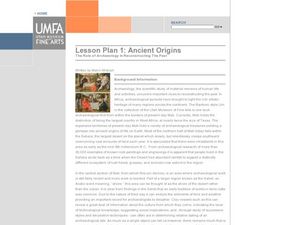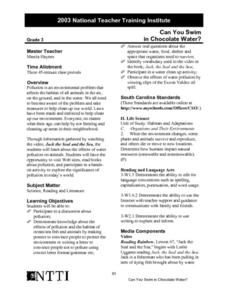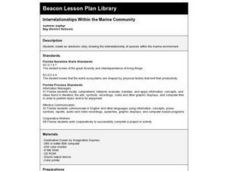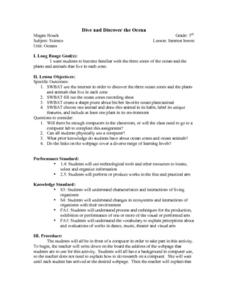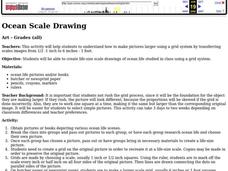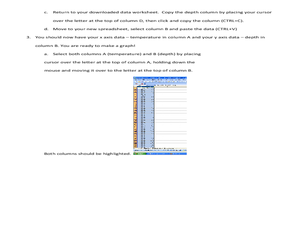Curated OER
This Life Stinks
Students study cold seeps and see how organisms obtain energy from methane. In this sinkholes lesson students examine the relevance of chemosynthesis to communities.
Curated OER
Seas Of Life
Students brainstorm examples of predator and prey that are featured in a video they watch. In this investigative lesson students will research an animal from the video and explain if it is a predator or prey and how it helps...
Curated OER
The Extraordinary Life of the Alaskan Tundra
Students investigate the characteristics of the tundra on the North Slope of Alaska. They conduct Internet research, develop a chart of the types of vegetation, plant growth, and fauna found on the tundra, identify examples in their own...
Curated OER
What's in that Cake?
Learners discover the methods scientists use to investigate Oceanic habitats. In this oceanography lesson, students utilize the Internet to identify deep sea submersibles and how they help scientists study the Charleston Bump....
Curated OER
Energy Flow in Ecosystems
Young scholars, in groups, create a slide show about the ecosystem and answer critical thinking questions based on their research.
Curated OER
Ancient Origins: The Role of Archaeology in Reconstructing the Past
Learners read information about the ancient origins of art and archaeology with a focus on the Malian culture. In this art origins lesson, students read background information for the topic and compare ancient and contemporary objects....
Curated OER
Can You Swim in Chocolate Water?
Third graders discss water pollution and its affects on animals. They watch a demonstration using a plastic fish in a fish bowl in which various types of water pollution are illustrated.
Curated OER
Is It Getting Hot In Here?
Students describe several factors and ways climate change could effect communities. In this climate change lesson plan students research climate change and complete a worksheet.
Curated OER
Interrelationships Within the Marine Community
Fourth graders create an electronic story showing the interrelationship of species within the marine environment. They utilize the educational software, 'Destination Ocean' during this engaging lesson.
Curated OER
Dive and Discover the Ocean
Third graders investigate the three zones of the ocean and the plants and animals that live in each zone. Projects produced are shared with classmates in a share circle where the unique features of the animal and zone selected are...
Curated OER
Survival in the Open Ocean
Students examine how scientists conduct pelagic research and identify pelagic predators as they study the open-ocean ecosystem. They discuss and conduct small group research of this environment in order to produce a presentation.
Curated OER
Creatures of the Ocean
Second graders examine the characteristics of a specific ocean creature. In pairs, 2nd graders create a graphic organizer to list categories and supporting details of the ocean creature. Students review data and use it to write a report...
Curated OER
What's Left to Explore-Space and the Ocean Floor
Students describe unique exploration studies of the ocean floor and space. They utilize research skills and write summaries of research studies using the Internet. Students answer a variety of questions over their research findings.
Curated OER
Ocean Scale Drawing
Students explain how to make pictures larger using a grid system by transferring scales images from 1/2 -1 inch to 6 inches - 1 foot. They create life-size scale drawings of ocean life studied in class using a grid system.
NOAA
Sediments
Calcareous ooze ... what an interesting name! The 15th installment of a 23-part NOAA Enrichment in Marine sciences and Oceanography (NEMO) program focuses on sediments found on the ocean floor. After viewing the slideshow lecture,...
Curated OER
Under the Sea - KWL Chart
Students create a KWL chart to start the discussion on ocean animals. They practice sorting the animals into their different classifications. They use indexes, table of contents and glossary to find information.
NOAA
Coastal Dynamics
Life's a beach! The 16th installment of a 23-part NOAA Enrichment in Marine sciences and Oceanography (NEMO) program first examines different types of coasts and how they form. An activity then has learners investigate the shoreline...
Curated OER
What's A Water Column Profile?
Students investigate water column data. In this earth science and seawater lesson plan, students determine how temperature, salinity, and density have an impact on sea water by viewing and analyzing data obtained from a number of...
Curated OER
The Salt Water Connection
Students investigate the various factors that influence the Pacific Ocean and Monterey Bay, California. They watch a video about Monterey Bay and take notes, and conduct research and write a report about a specific organism living in...
Curated OER
Polar Bear Panic!
Students identify the three realms of the Arctic Ocean, and describe the relationships between these realms. They graphically analyze data on sea ice cover in the Arctic Ocean, and recognize a trend in these data.
Curated OER
Sunken Slave Ship
Students investigate shipwrecks. In this marine archaeology lesson, students create the site of a shipwreck by using a tub filled with sand and items from a "ship". Students excavate the site and analyze the findings.
Curated OER
Sea and Ice Salinity
Students conduct an experiment. In this salinity lesson, students learn about sea ice, why it is important and how changing amounts can affect the sea. Students conduct an experiment to find out the effects of salinity on the...
Curated OER
Hawaii's Sea Turtle Exploration
Students investigate the life cycle and body parts of Hawaii's sea turtles. For this sea turtle lesson, students watch a video about the turtle life cycle and make a model of a "Honu," sea turtle. They complete an associated worksheet.
Curated OER
Introduction to Oceans
Students complete a variety of activities in preparation for a unit on oceans. They discuss their own proximity to the ocean, identify and name the oceans on a globe, and in small groups identify facts about a selected ocean. Students...







